
agentlang
Generative AI-powered Programming Language
Stars: 120
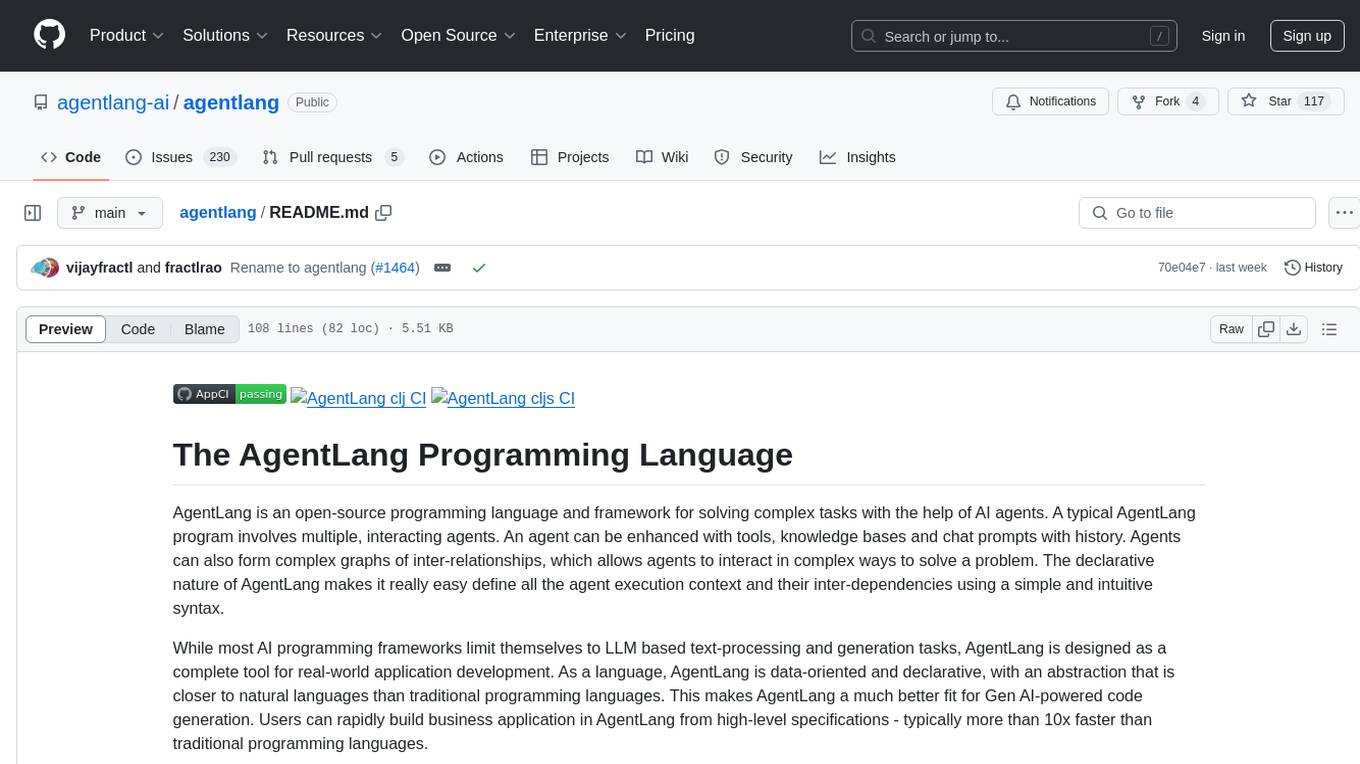
AgentLang is an open-source programming language and framework designed for solving complex tasks with the help of AI agents. It allows users to build business applications rapidly from high-level specifications, making it more efficient than traditional programming languages. The language is data-oriented and declarative, with a syntax that is intuitive and closer to natural languages. AgentLang introduces innovative concepts such as first-class AI agents, graph-based hierarchical data model, zero-trust programming, declarative dataflow, resolvers, interceptors, and entity-graph-database mapping.
README:
AgentLang is the easiest way to build AI Agents, Chatbots and Apps - build teams of AI agents that collaborate (with other AI agents and humans) to handle complex, time-consuming, monotonous tasks. AgentLang is a data-oriented, declarative abstraction for building agents and apps, similar to how Terraform is a declarative abstraction for infrastructure-as-code.
The AgentLang language specification, its compiler and runtime are open source. AgentLang programs can run anywhere - avoiding the vendor lock-in of other AI agent/programming platforms.
AgentLang runtime has native integration with databases, vector databases, auth stores, etc. AgentLang programs run on the JVM and can make use of any of the millions of existing Java/Clojure and other JVM libraries out there.
AgentLang comes with all the modern tooling, dependency management and REPL needed to build production-grade agents and apps.
Agents are a built-in language construct - developers can choose from one of the built-in agent-types, or easily add their own agent-types.
(component :Chat)
{:Agentlang.Core/Agent
{:Name :comedian
:Input :Chat/Session
:UserInstruction "You are an AI bot who tell jokes"}}(Save this example in a file named chat.al. In a later section, we will show you how to run it)
AI Agents can delegate tasks to other specialized agents and dramatically increase the efficiency and accuracy of agentic behavior.
Analyse scanned images of expense receipts and generate expense records
;; file: expense.al
(component :Expense)
(entity
:Expense
{:Id :Identity
:Title :String
:Amount :Double})
{:Agentlang.Core/Agent
{:Name :ocr-agent
:Type :ocr
:UserInstruction (str "Analyse the image of a receipt and return only the items and their amounts. "
"No need to include sub-totals, totals and other data.")}}
{:Agentlang.Core/Agent
{:Name :expense-agent
:Type :planner
:UserInstruction "Convert an expense report into individual instances of the expense entity."
:Tools [:Expense/Expense]
:Input :Expense/SaveExpenses
:Delegates {:To :ocr-agent :Preprocessor true}}}Model any business domain - from simple to complex - with the relationship graph based data modeling approach of AgentLang. Apply RBAC policies, declaratively, to the data model and secure your application data.
Defines the model for a simple accounting application, where the income and expense records of multiple users can be tracked separately.
;; file: accounts.al
(component :Accounts)
(entity
:User
{:Email {:type :Email :guid true}
:Name :String
:Created :Now})
(record
:Entry
{:Id :Identity
:Description :String
:Date :Now
:Amount :Double})
(entity :Income {:meta {:inherits :Entry}})
(entity :Expense {:meta {:inherits :Entry}})
(relationship :UserIncome {:meta {:contains [:User :Income]}})
(relationship :UserExpense {:meta {:contains [:User :Expense]}})A dataflow allows you to express complex business logic simply as purely-declarative patterns of data operations. The dataflow defined below creates an income and expense report, given the email of a user:
;; file: accounts.al
(defn compute-total [entries]
(apply + (mapv :Amount entries)))
(record
:Report
{:Incomes {:listof :Income}
:Expenses {:listof :Expense}
:TotalIncome '(accounts/compute-total :Incomes)
:TotalExpense '(accounts/compute-total :Expenses)
:NetIncome '(- :TotalIncome :TotalExpense)})
(dataflow
:GenerateReport
{:User {:Email? :GenerateReport.Email} :as [:U]} ; find the user
; query the user's incomes and expenses:
{:Income? {} :-> [[:UserIncome? :U]] :as :Incomes}
{:Expense? {} :-> [[:UserExpense? :U]] :as :Expenses}
{:Report {:Incomes :Incomes :Expenses :Expenses}})- Linux, Mac OSX or a Unix emulator in Windows
- Download and install the AgentLang CLI tool or use it via Docker
- Pre-requisite: Java SE 21 or later
- Pre-requisite: Git CLI for your OS
- Set the
OPENAI_API_KEYenvironment variable to a valid API key from OpenAI
agent /path/to/chat.alOr run it via Docker (assuming the file chat.al is in the current directory):
docker run --rm \
-v .:/agentlang \
-e OPENAI_API_KEY="$OPENAI_API_KEY" \
-p 8080:8080 \
-it agentlang/agentlang.cli:latest \
agent chat.alOnce the agent starts running, send it a message with an HTTP POST,
curl --header "Content-Type: application/json" \
--request POST \
--data '{"Chat/Session": {"UserInstruction": "tell me a joke about AI agents"}}' \
http://localhost:8080/api/Chat/SessionYou should see a response from the agent with a joke about itself!
Now you can try running the expenses example:
agent /path/to/expense.alOr run it via Docker (assuming the file expense.al is in the current directory):
docker run --rm \
-v .:/agentlang \
-e OPENAI_API_KEY="$OPENAI_API_KEY" \
-p 8080:8080 \
-it agentlang/agentlang.cli:latest \
agent expense.alSend a request with a proper URL pointing to the image of a receipt or a bill:
curl --header "Content-Type: application/json" \
--request POST \
--data '{"Expense/SaveExpenses": {"UserInstruction": "https://acme.com/receipts/r01.png"}}' \
http://localhost:8080/api/Expense/SaveExpensesOnce the expenses are processed, you can execute the following GET request to fetch the individual expense items that were created:
curl --header "Content-Type: application/json" http://localhost:8080/api/Expense/ExpenseNext we will try running the account example:
agent /path/to/accounts.alOr run it via Docker (assuming the file accounts.al is in the current directory):
docker run --rm \
-v .:/agentlang \
-e OPENAI_API_KEY="$OPENAI_API_KEY" \
-p 8080:8080 \
-it agentlang/agentlang.cli:latest \
agent accounts.alCreate a user:
curl --header "Content-Type: application/json" \
--request POST \
--data '{"Accounts/User": {"Email": "[email protected]", "Name": "JJ"}}' \
http://localhost:8080/api/Accounts/UserMake some account entries for the user:
curl --header "Content-Type: application/json" \
--request POST \
--data '{"Accounts/Income": {"Description": "salary", "Amount": 3450.54}}' \
http://localhost:8080/api/Accounts/User/[email protected]/UserIncome/Income
curl --header "Content-Type: application/json" \
--request POST \
--data '{"Accounts/Expense": {"Description": "rent", "Amount": 50.0}}' \
http://localhost:8080/api/Accounts/User/[email protected]/UserExpense/ExpenseGenerate the income and expense report:
curl --header "Content-Type: application/json" \
--request POST \
--data '{"Accounts/GenerateReport": {"Email": "[email protected]"}}' \
http://localhost:8080/api/Accounts/GenerateReportIf you are excited about cutting-edge AI and programming language technology, please consider becoming a contributor to the Agentlang project.
There are two main ways you can contribute:
- Try out the language, report bugs and proposals in the project's issue tracker.
- Actively participate in the development of Agentlang and submit your patches as pull requests.
Copyright 2024 Fractl Inc.
Licensed under the Apache License, Version 2.0: http://www.apache.org/licenses/LICENSE-2.0
For Tasks:
Click tags to check more tools for each tasksFor Jobs:
Alternative AI tools for agentlang
Similar Open Source Tools

agentlang
AgentLang is an open-source programming language and framework designed for solving complex tasks with the help of AI agents. It allows users to build business applications rapidly from high-level specifications, making it more efficient than traditional programming languages. The language is data-oriented and declarative, with a syntax that is intuitive and closer to natural languages. AgentLang introduces innovative concepts such as first-class AI agents, graph-based hierarchical data model, zero-trust programming, declarative dataflow, resolvers, interceptors, and entity-graph-database mapping.
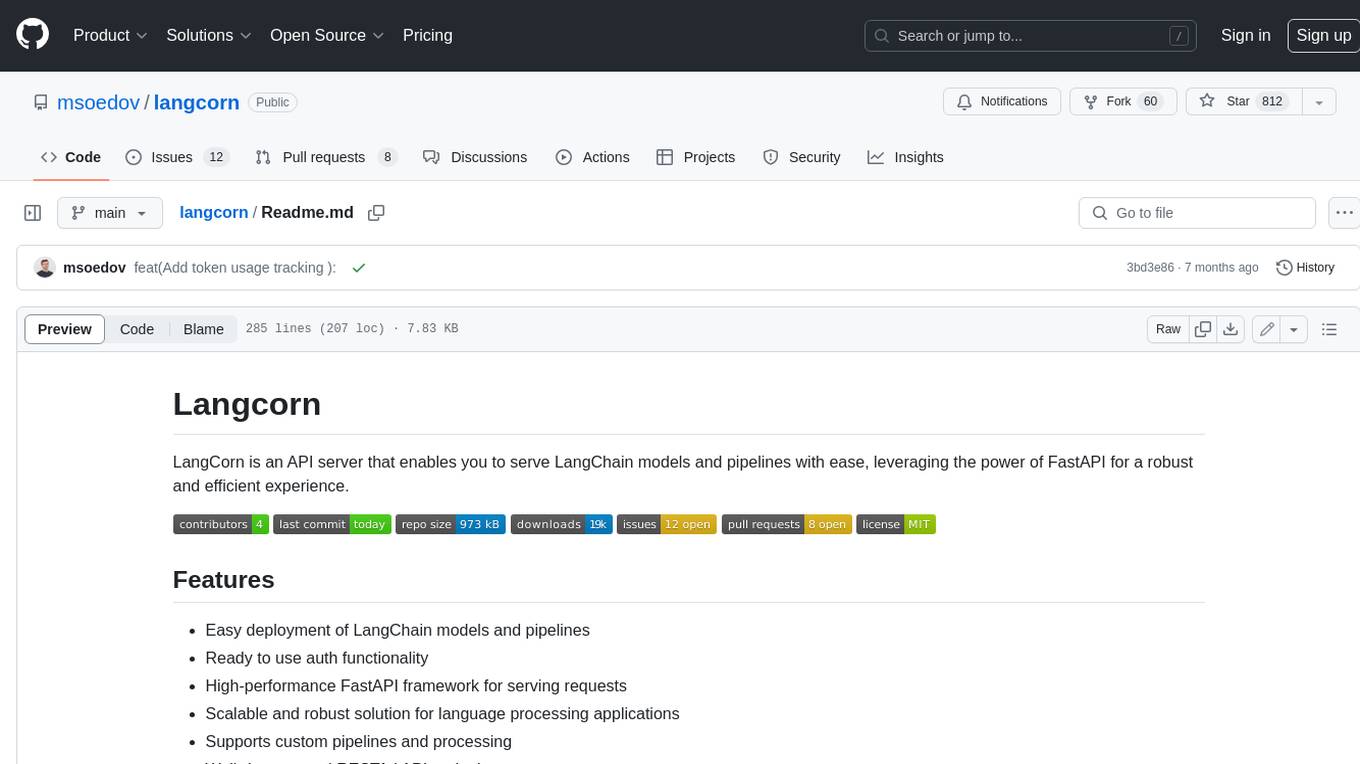
langcorn
LangCorn is an API server that enables you to serve LangChain models and pipelines with ease, leveraging the power of FastAPI for a robust and efficient experience. It offers features such as easy deployment of LangChain models and pipelines, ready-to-use authentication functionality, high-performance FastAPI framework for serving requests, scalability and robustness for language processing applications, support for custom pipelines and processing, well-documented RESTful API endpoints, and asynchronous processing for faster response times.
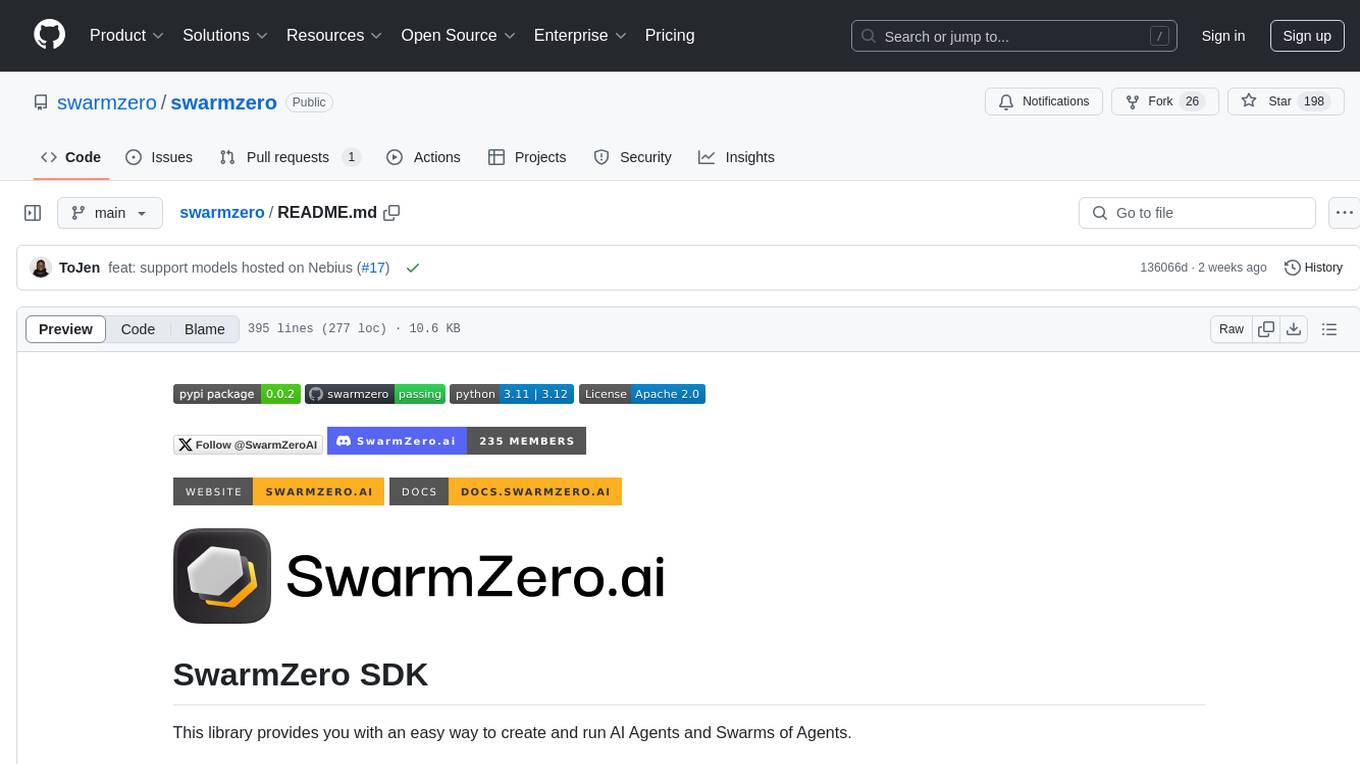
swarmzero
SwarmZero SDK is a library that simplifies the creation and execution of AI Agents and Swarms of Agents. It supports various LLM Providers such as OpenAI, Azure OpenAI, Anthropic, MistralAI, Gemini, Nebius, and Ollama. Users can easily install the library using pip or poetry, set up the environment and configuration, create and run Agents, collaborate with Swarms, add tools for complex tasks, and utilize retriever tools for semantic information retrieval. Sample prompts are provided to help users explore the capabilities of the agents and swarms. The SDK also includes detailed examples and documentation for reference.
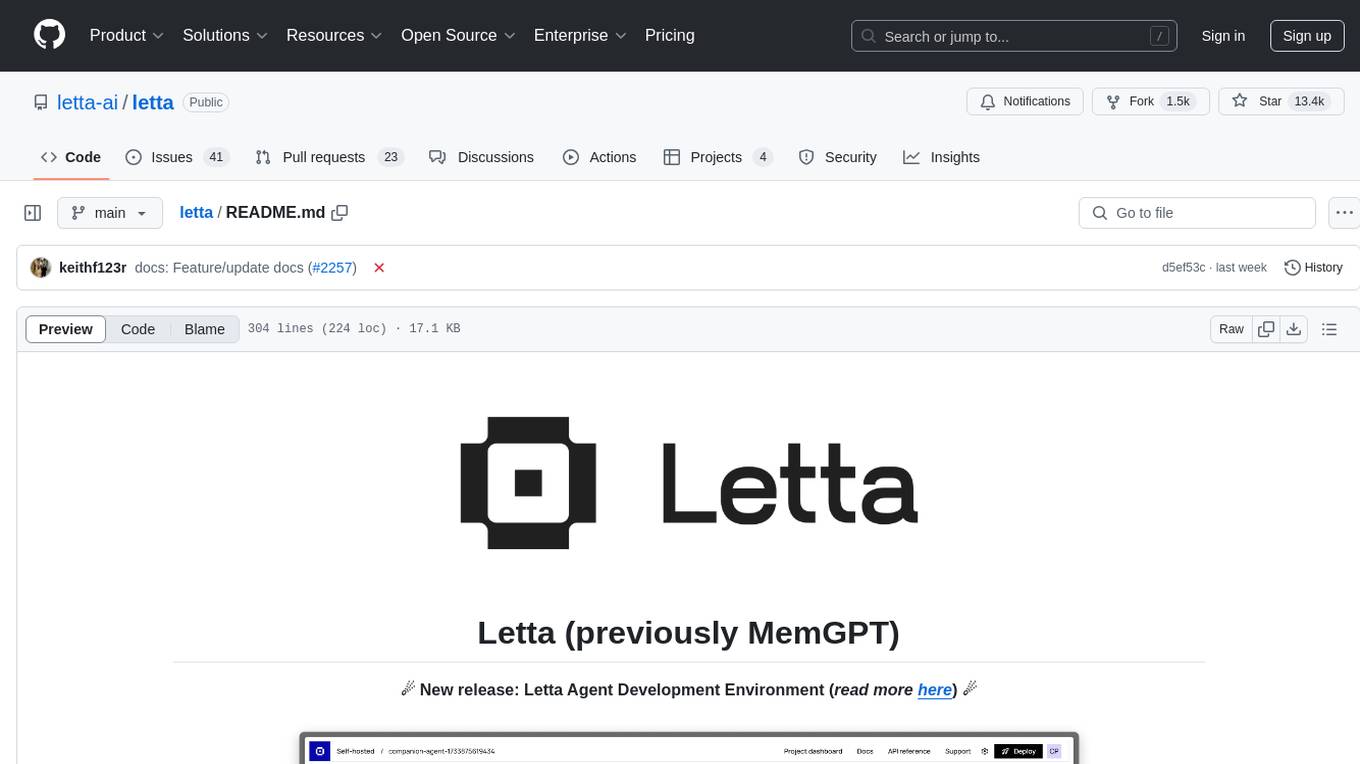
letta
Letta is an open source framework for building stateful LLM applications. It allows users to build stateful agents with advanced reasoning capabilities and transparent long-term memory. The framework is white box and model-agnostic, enabling users to connect to various LLM API backends. Letta provides a graphical interface, the Letta ADE, for creating, deploying, interacting, and observing with agents. Users can access Letta via REST API, Python, Typescript SDKs, and the ADE. Letta supports persistence by storing agent data in a database, with PostgreSQL recommended for data migrations. Users can install Letta using Docker or pip, with Docker defaulting to PostgreSQL and pip defaulting to SQLite. Letta also offers a CLI tool for interacting with agents. The project is open source and welcomes contributions from the community.
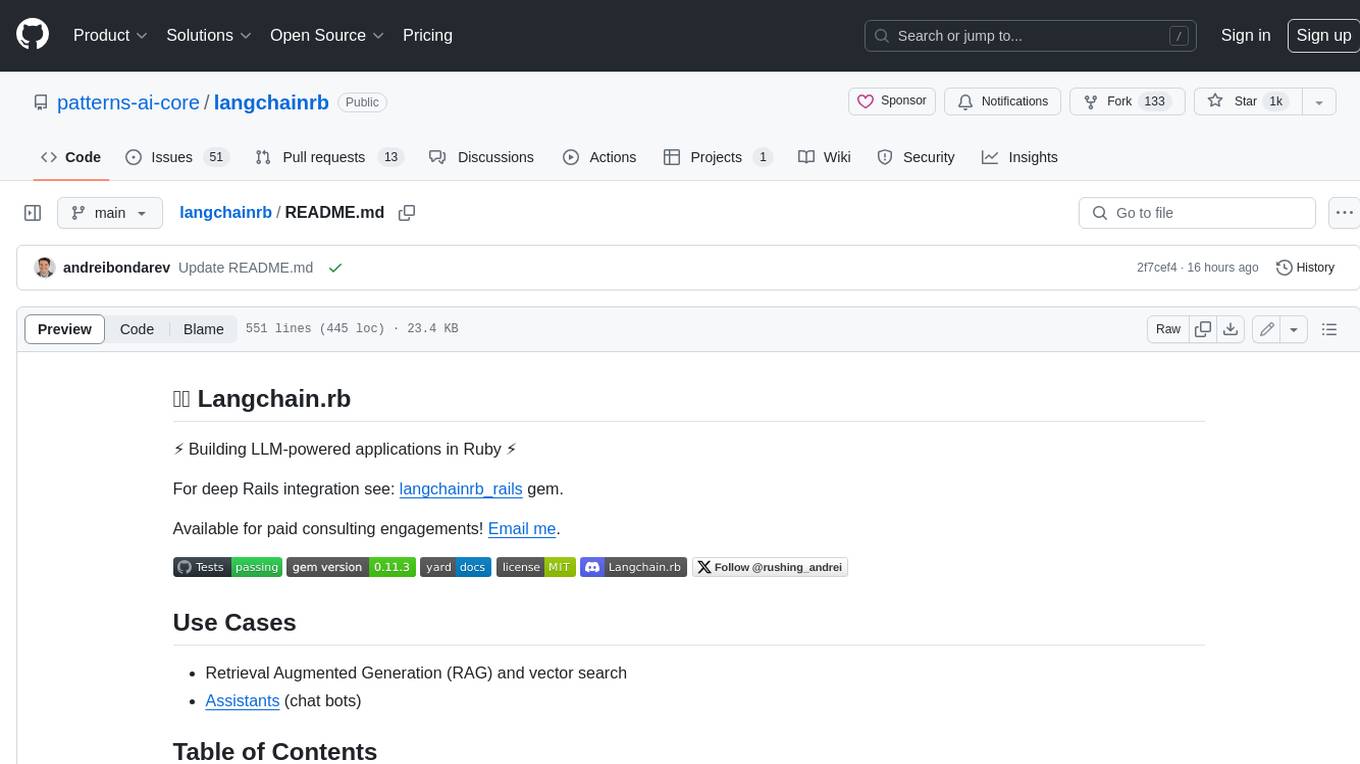
langchainrb
Langchain.rb is a Ruby library that makes it easy to build LLM-powered applications. It provides a unified interface to a variety of LLMs, vector search databases, and other tools, making it easy to build and deploy RAG (Retrieval Augmented Generation) systems and assistants. Langchain.rb is open source and available under the MIT License.
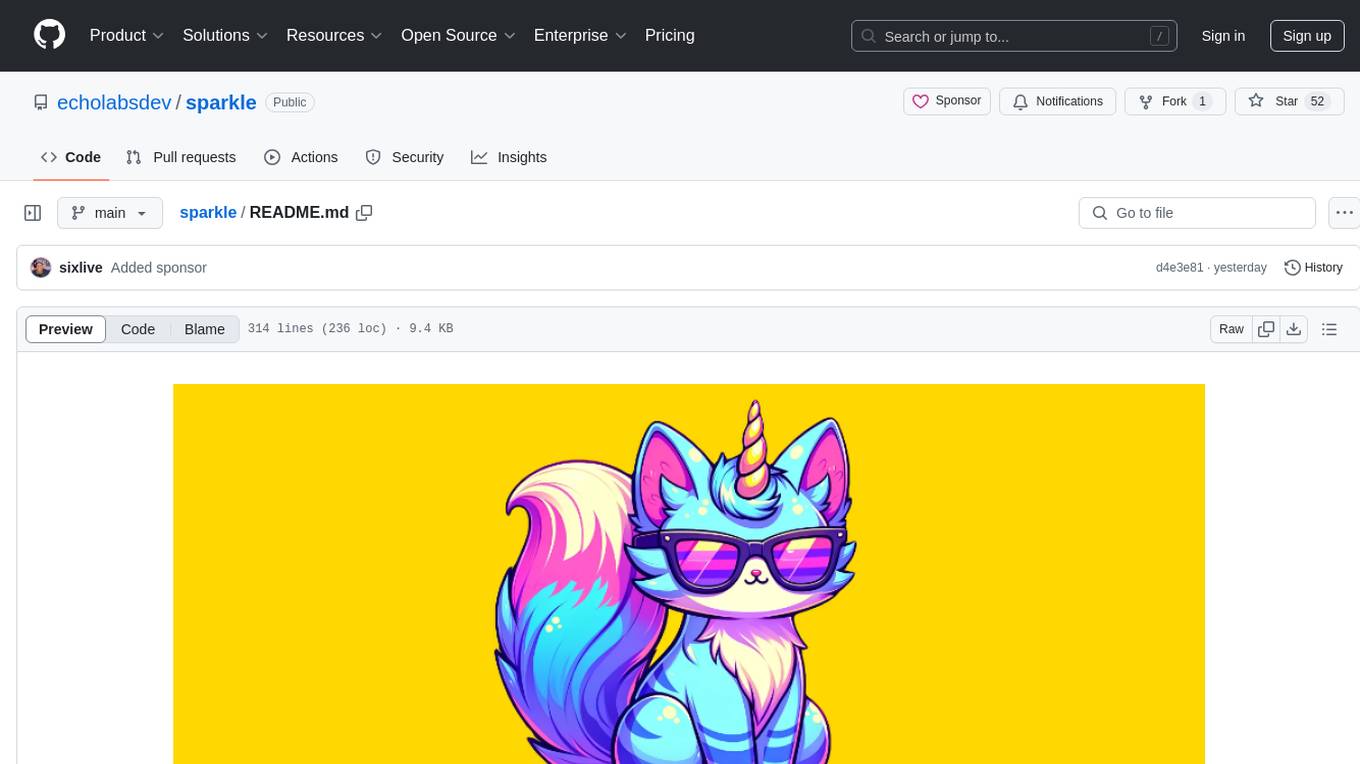
sparkle
Sparkle is a tool that streamlines the process of building AI-driven features in applications using Large Language Models (LLMs). It guides users through creating and managing agents, defining tools, and interacting with LLM providers like OpenAI. Sparkle allows customization of LLM provider settings, model configurations, and provides a seamless integration with Sparkle Server for exposing agents via an OpenAI-compatible chat API endpoint.
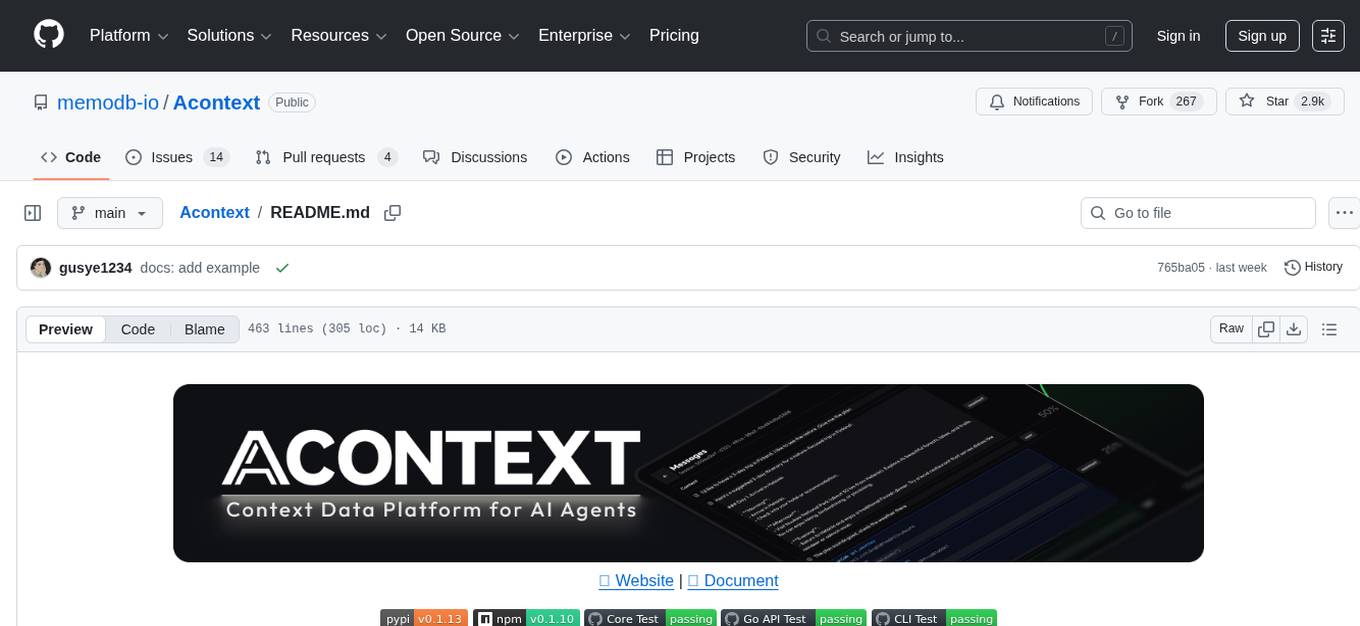
Acontext
Acontext is a context data platform designed for production AI agents, offering unified storage, built-in context management, and observability features. It helps agents scale from local demos to production without the need to rebuild context infrastructure. The platform provides solutions for challenges like scattered context data, long-running agents requiring context management, and tracking states from multi-modal agents. Acontext offers core features such as context storage, session management, disk storage, agent skills management, and sandbox for code execution and analysis. Users can connect to Acontext, install SDKs, initialize clients, store and retrieve messages, perform context engineering, and utilize agent storage tools. The platform also supports building agents using end-to-end scripts in Python and Typescript, with various templates available. Acontext's architecture includes client layer, backend with API and core components, infrastructure with PostgreSQL, S3, Redis, and RabbitMQ, and a web dashboard. Join the Acontext community on Discord and follow updates on GitHub.
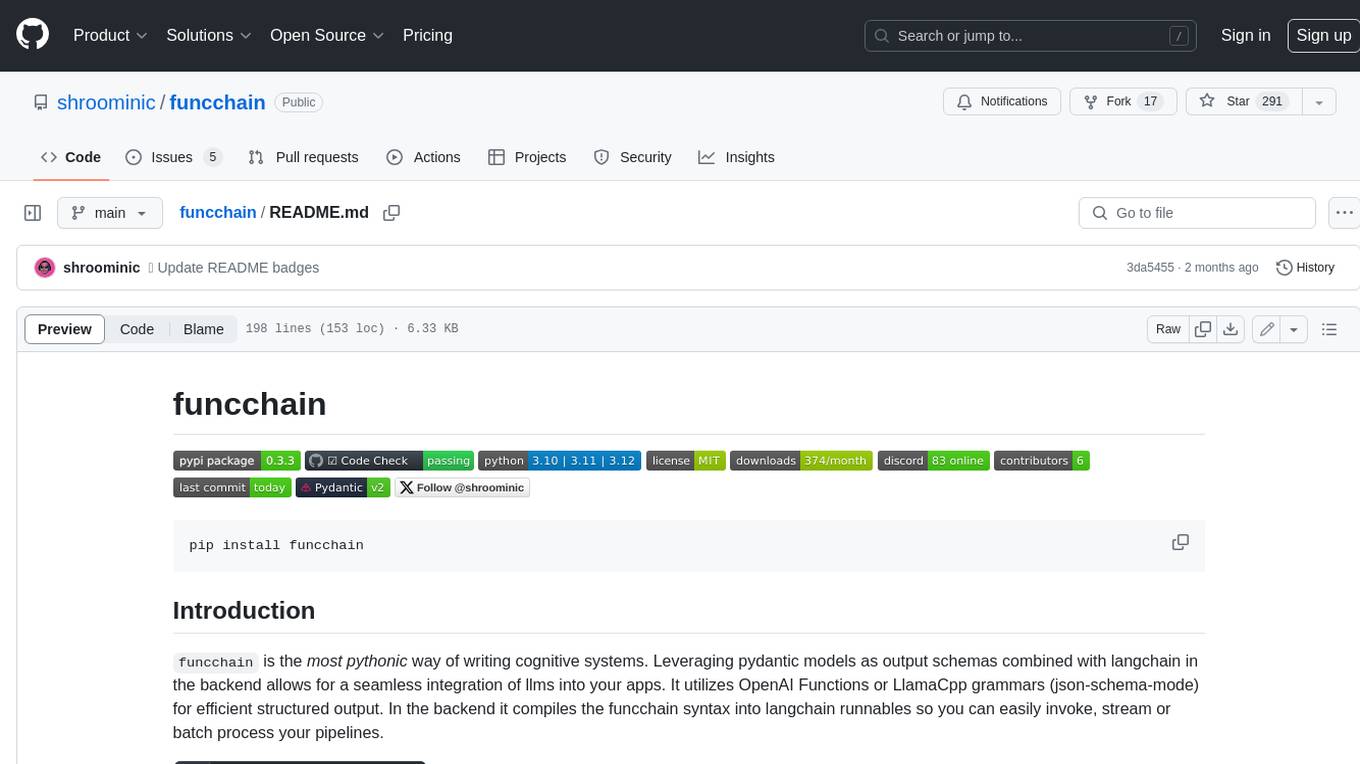
funcchain
Funcchain is a Python library that allows you to easily write cognitive systems by leveraging Pydantic models as output schemas and LangChain in the backend. It provides a seamless integration of LLMs into your apps, utilizing OpenAI Functions or LlamaCpp grammars (json-schema-mode) for efficient structured output. Funcchain compiles the Funcchain syntax into LangChain runnables, enabling you to invoke, stream, or batch process your pipelines effortlessly.
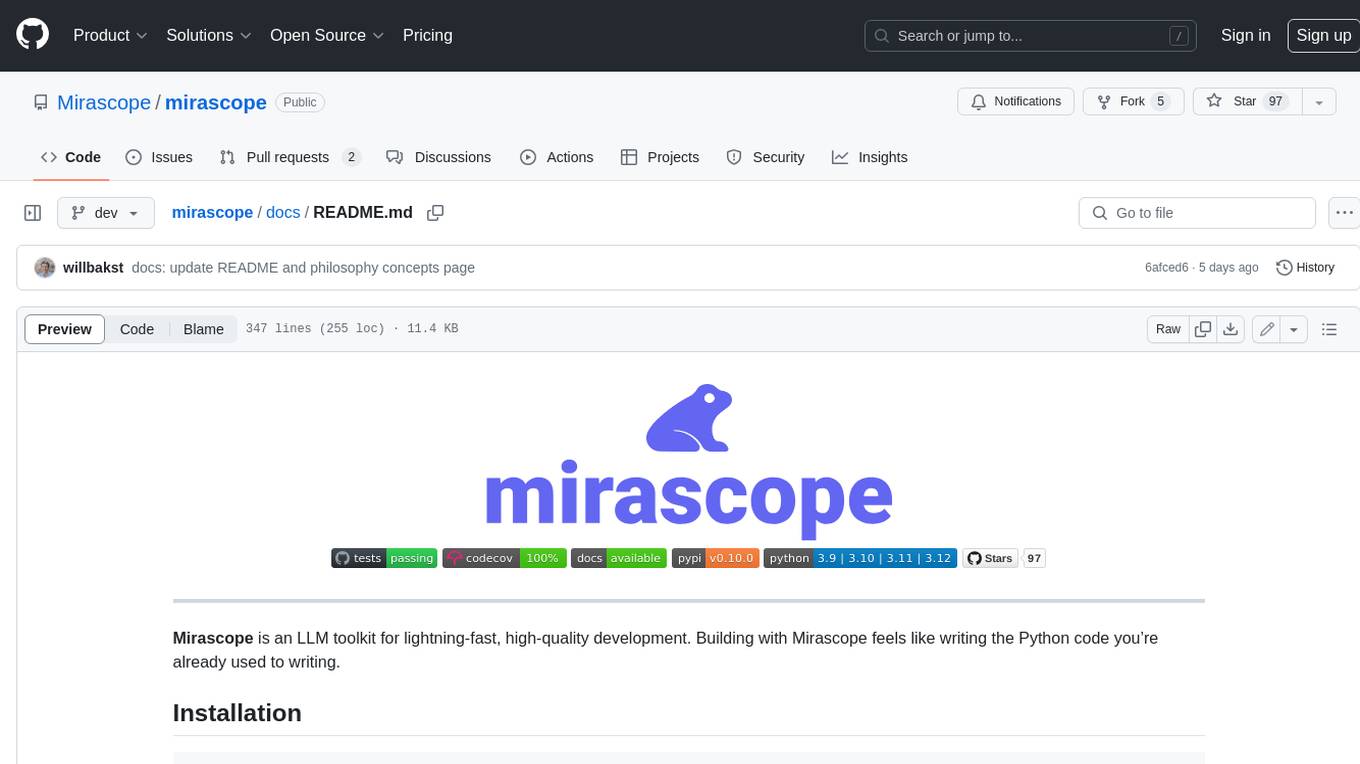
mirascope
Mirascope is an LLM toolkit for lightning-fast, high-quality development. Building with Mirascope feels like writing the Python code you’re already used to writing.
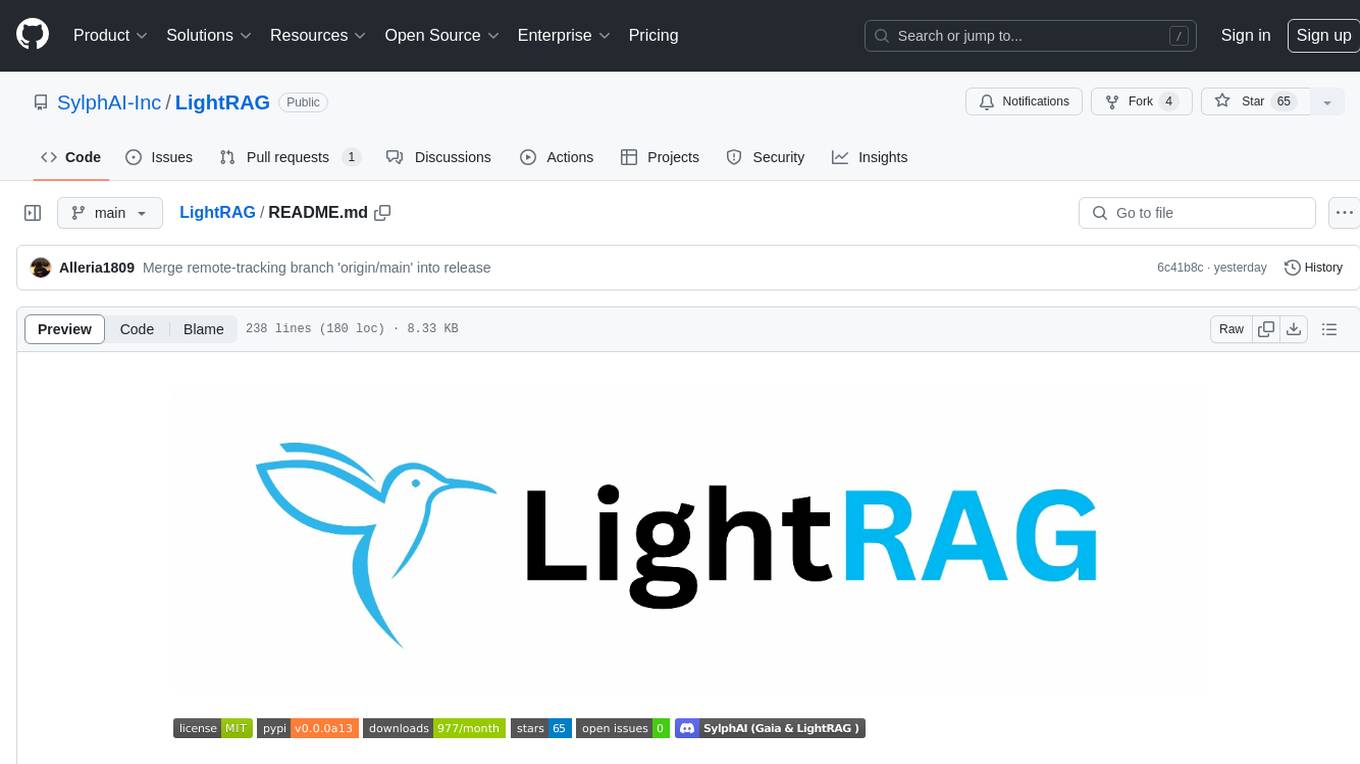
LightRAG
LightRAG is a PyTorch library designed for building and optimizing Retriever-Agent-Generator (RAG) pipelines. It follows principles of simplicity, quality, and optimization, offering developers maximum customizability with minimal abstraction. The library includes components for model interaction, output parsing, and structured data generation. LightRAG facilitates tasks like providing explanations and examples for concepts through a question-answering pipeline.
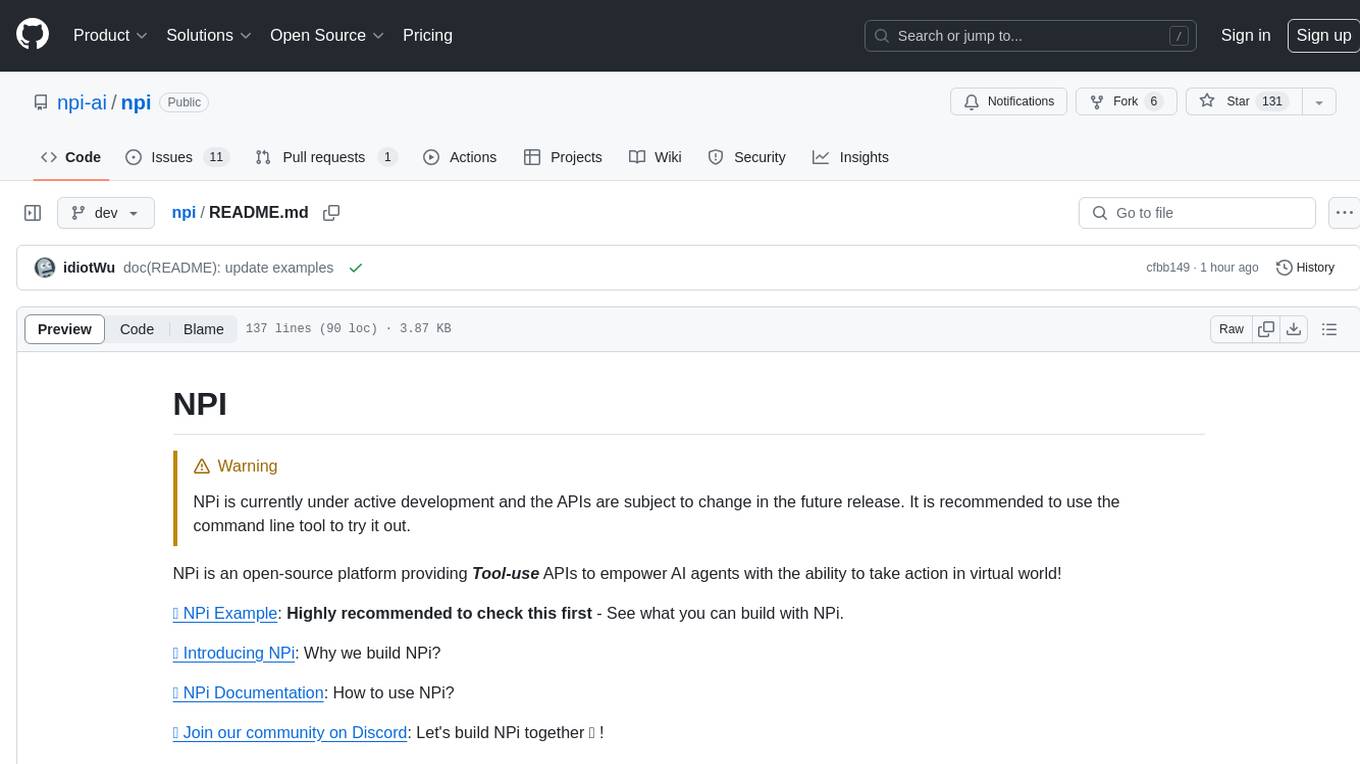
npi
NPi is an open-source platform providing Tool-use APIs to empower AI agents with the ability to take action in the virtual world. It is currently under active development, and the APIs are subject to change in future releases. NPi offers a command line tool for installation and setup, along with a GitHub app for easy access to repositories. The platform also includes a Python SDK and examples like Calendar Negotiator and Twitter Crawler. Join the NPi community on Discord to contribute to the development and explore the roadmap for future enhancements.
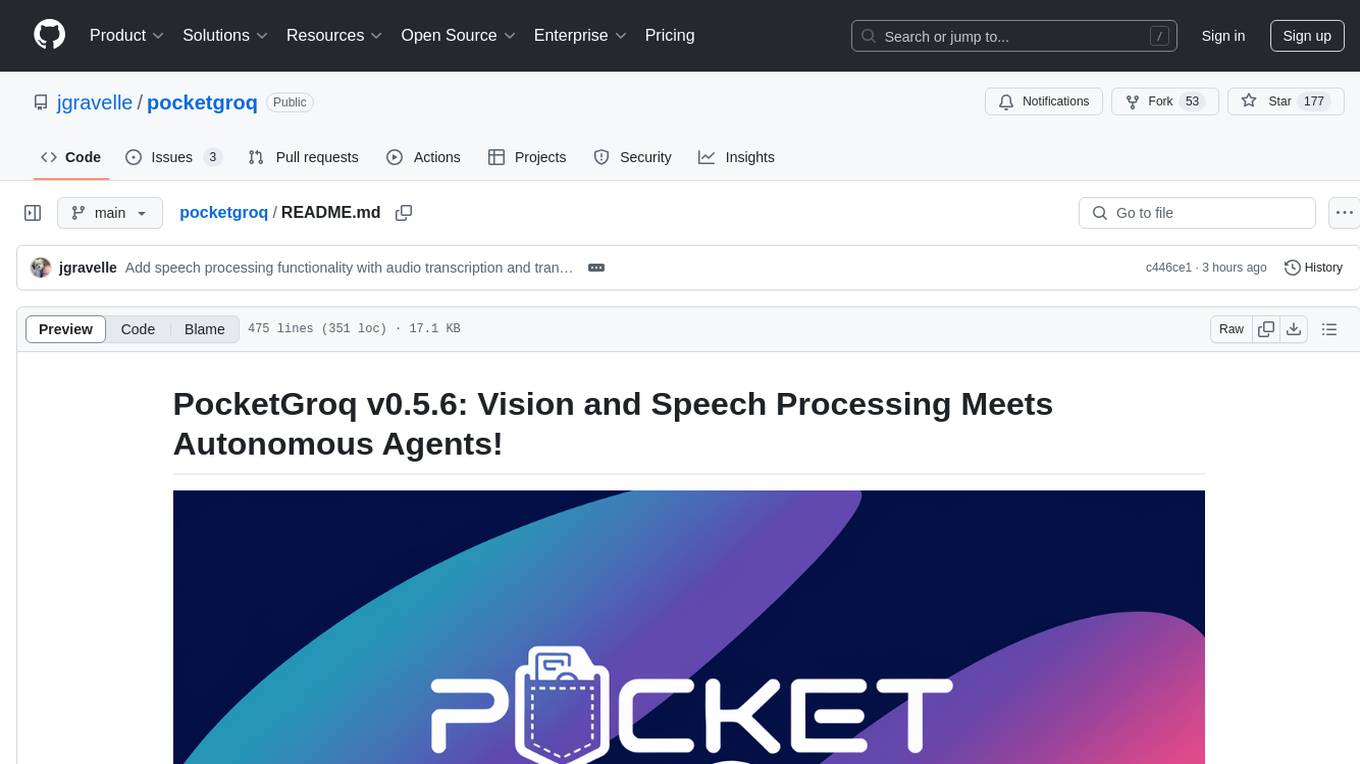
pocketgroq
PocketGroq is a tool that provides advanced functionalities for text generation, web scraping, web search, and AI response evaluation. It includes features like an Autonomous Agent for answering questions, web crawling and scraping capabilities, enhanced web search functionality, and flexible integration with Ollama server. Users can customize the agent's behavior, evaluate responses using AI, and utilize various methods for text generation, conversation management, and Chain of Thought reasoning. The tool offers comprehensive methods for different tasks, such as initializing RAG, error handling, and tool management. PocketGroq is designed to enhance development processes and enable the creation of AI-powered applications with ease.

instructor
Instructor is a popular Python library for managing structured outputs from large language models (LLMs). It offers a user-friendly API for validation, retries, and streaming responses. With support for various LLM providers and multiple languages, Instructor simplifies working with LLM outputs. The library includes features like response models, retry management, validation, streaming support, and flexible backends. It also provides hooks for logging and monitoring LLM interactions, and supports integration with Anthropic, Cohere, Gemini, Litellm, and Google AI models. Instructor facilitates tasks such as extracting user data from natural language, creating fine-tuned models, managing uploaded files, and monitoring usage of OpenAI models.
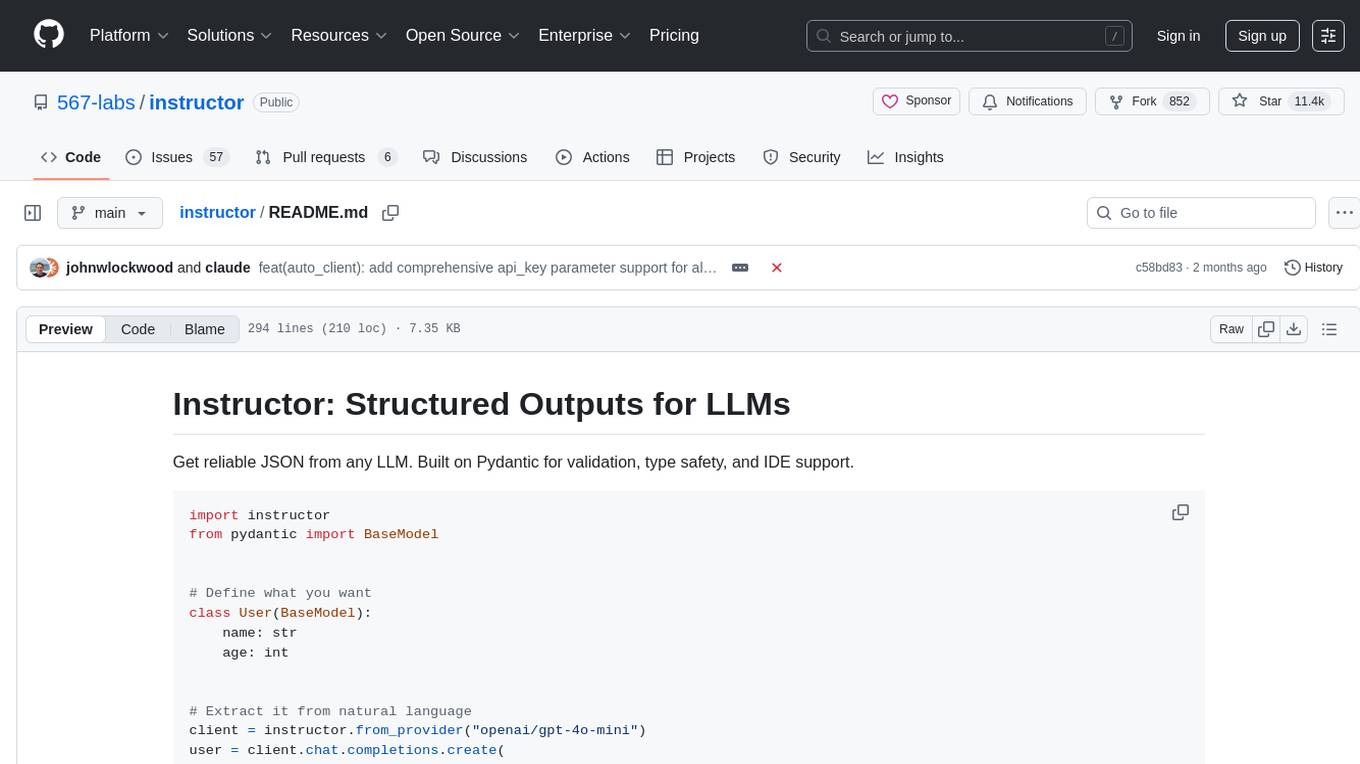
instructor
Instructor is a tool that provides structured outputs from Large Language Models (LLMs) in a reliable manner. It simplifies the process of extracting structured data by utilizing Pydantic for validation, type safety, and IDE support. With Instructor, users can define models and easily obtain structured data without the need for complex JSON parsing, error handling, or retries. The tool supports automatic retries, streaming support, and extraction of nested objects, making it production-ready for various AI applications. Trusted by a large community of developers and companies, Instructor is used by teams at OpenAI, Google, Microsoft, AWS, and YC startups.
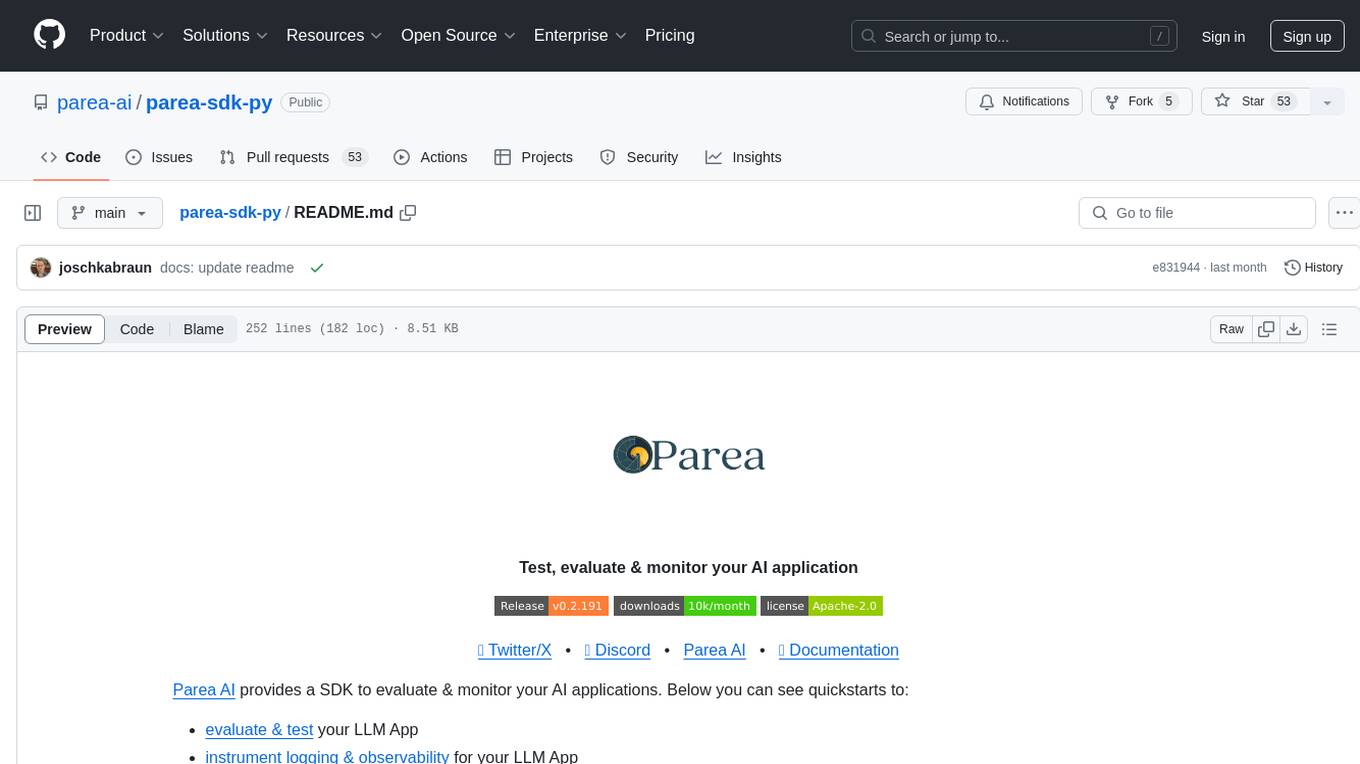
parea-sdk-py
Parea AI provides a SDK to evaluate & monitor AI applications. It allows users to test, evaluate, and monitor their AI models by defining and running experiments. The SDK also enables logging and observability for AI applications, as well as deploying prompts to facilitate collaboration between engineers and subject-matter experts. Users can automatically log calls to OpenAI and Anthropic, create hierarchical traces of their applications, and deploy prompts for integration into their applications.
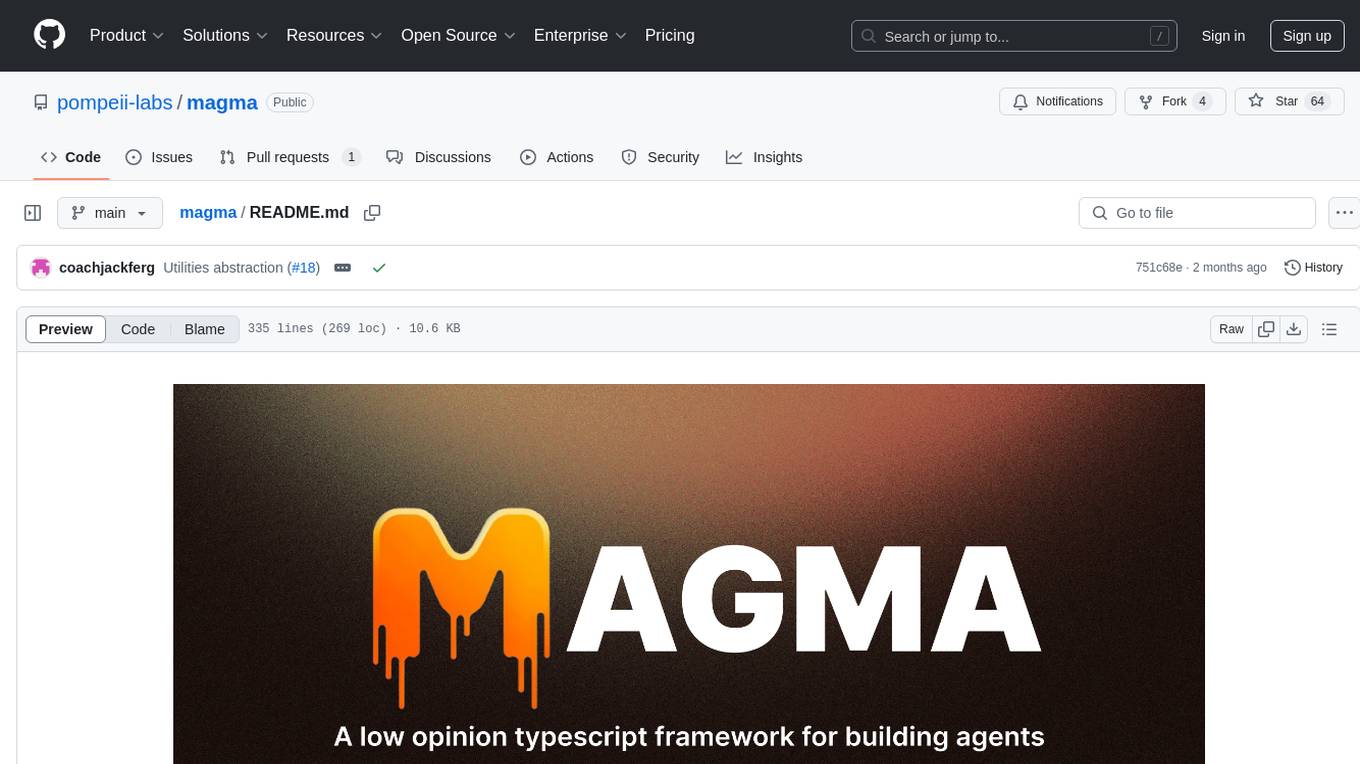
magma
Magma is a powerful and flexible framework for building scalable and efficient machine learning pipelines. It provides a simple interface for creating complex workflows, enabling users to easily experiment with different models and data processing techniques. With Magma, users can streamline the development and deployment of machine learning projects, saving time and resources.
For similar tasks
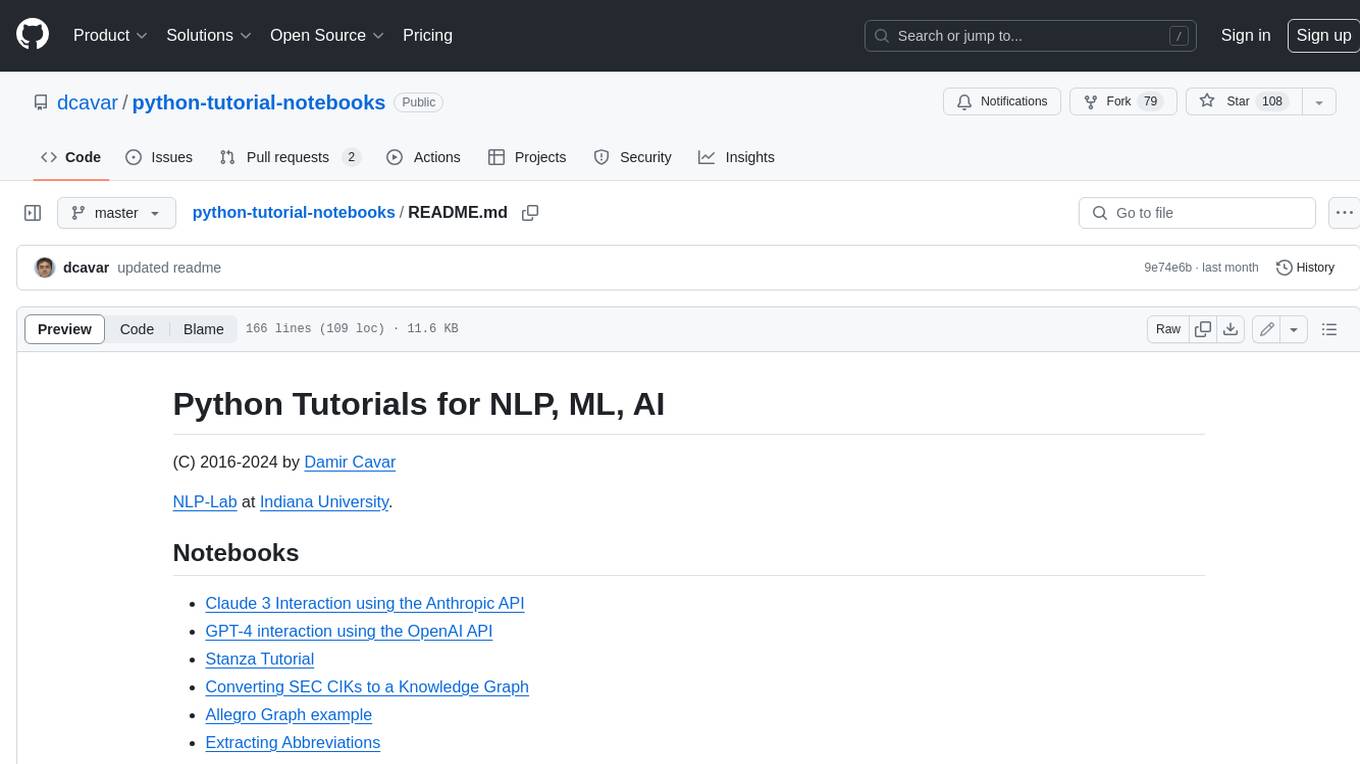
python-tutorial-notebooks
This repository contains Jupyter-based tutorials for NLP, ML, AI in Python for classes in Computational Linguistics, Natural Language Processing (NLP), Machine Learning (ML), and Artificial Intelligence (AI) at Indiana University.

open-parse
Open Parse is a Python library for visually discerning document layouts and chunking them effectively. It is designed to fill the gap in open-source libraries for handling complex documents. Unlike text splitting, which converts a file to raw text and slices it up, Open Parse visually analyzes documents for superior LLM input. It also supports basic markdown for parsing headings, bold, and italics, and has high-precision table support, extracting tables into clean Markdown formats with accuracy that surpasses traditional tools. Open Parse is extensible, allowing users to easily implement their own post-processing steps. It is also intuitive, with great editor support and completion everywhere, making it easy to use and learn.
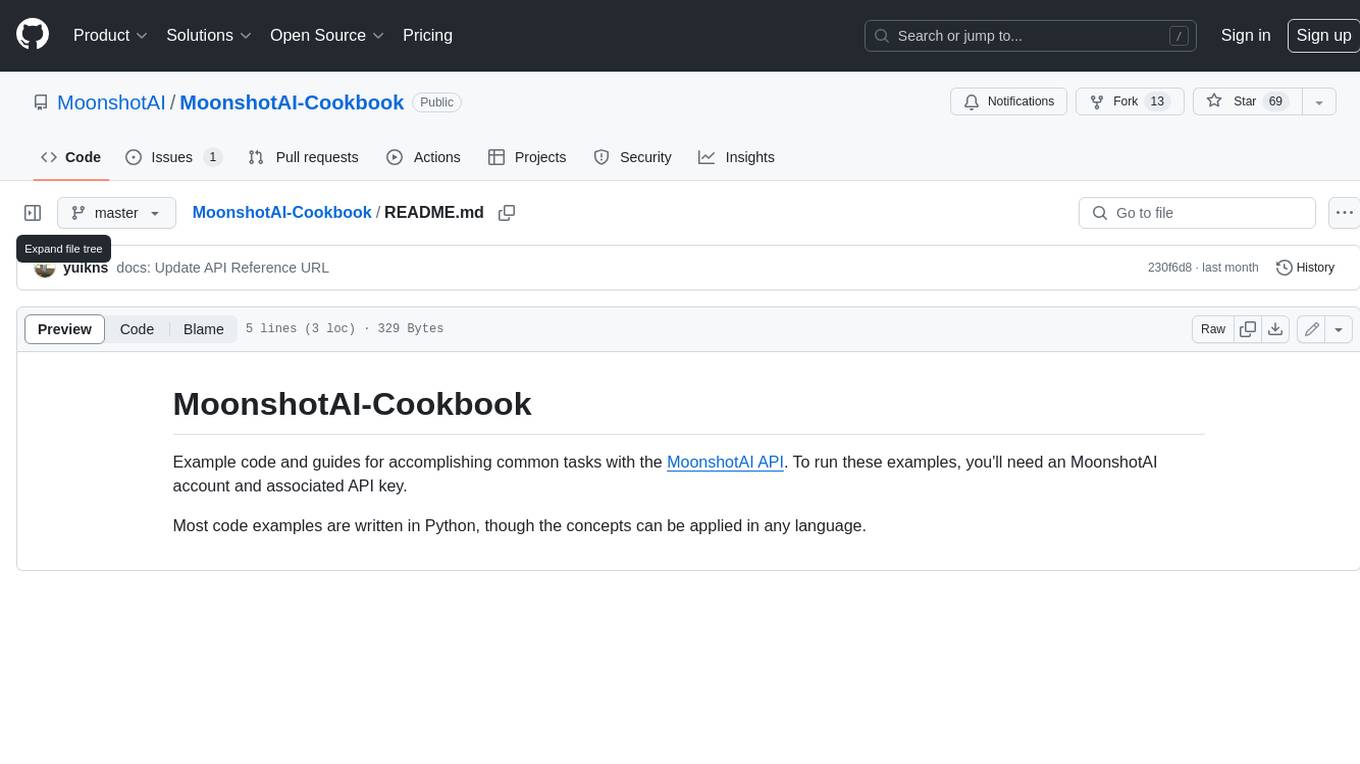
MoonshotAI-Cookbook
The MoonshotAI-Cookbook provides example code and guides for accomplishing common tasks with the MoonshotAI API. To run these examples, you'll need an MoonshotAI account and associated API key. Most code examples are written in Python, though the concepts can be applied in any language.
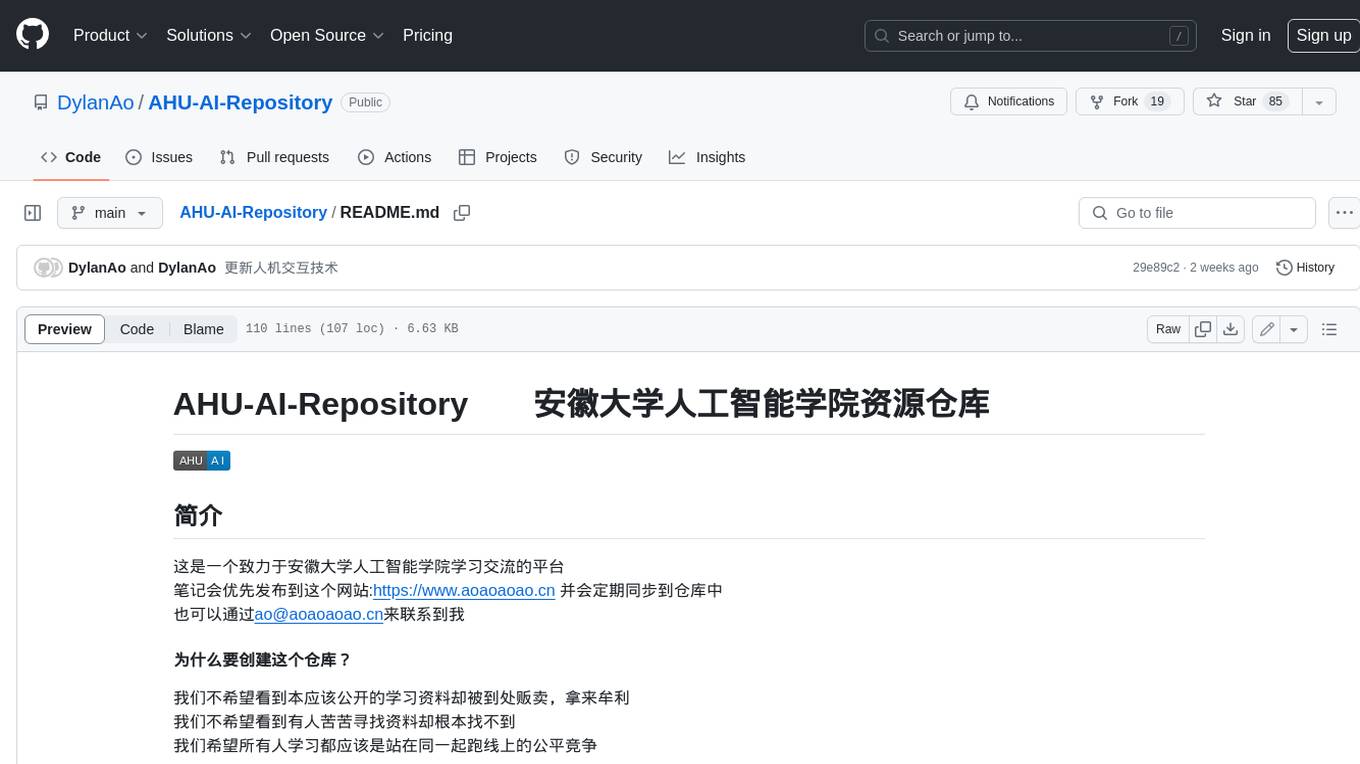
AHU-AI-Repository
This repository is dedicated to the learning and exchange of resources for the School of Artificial Intelligence at Anhui University. Notes will be published on this website first: https://www.aoaoaoao.cn and will be synchronized to the repository regularly. You can also contact me at [email protected].
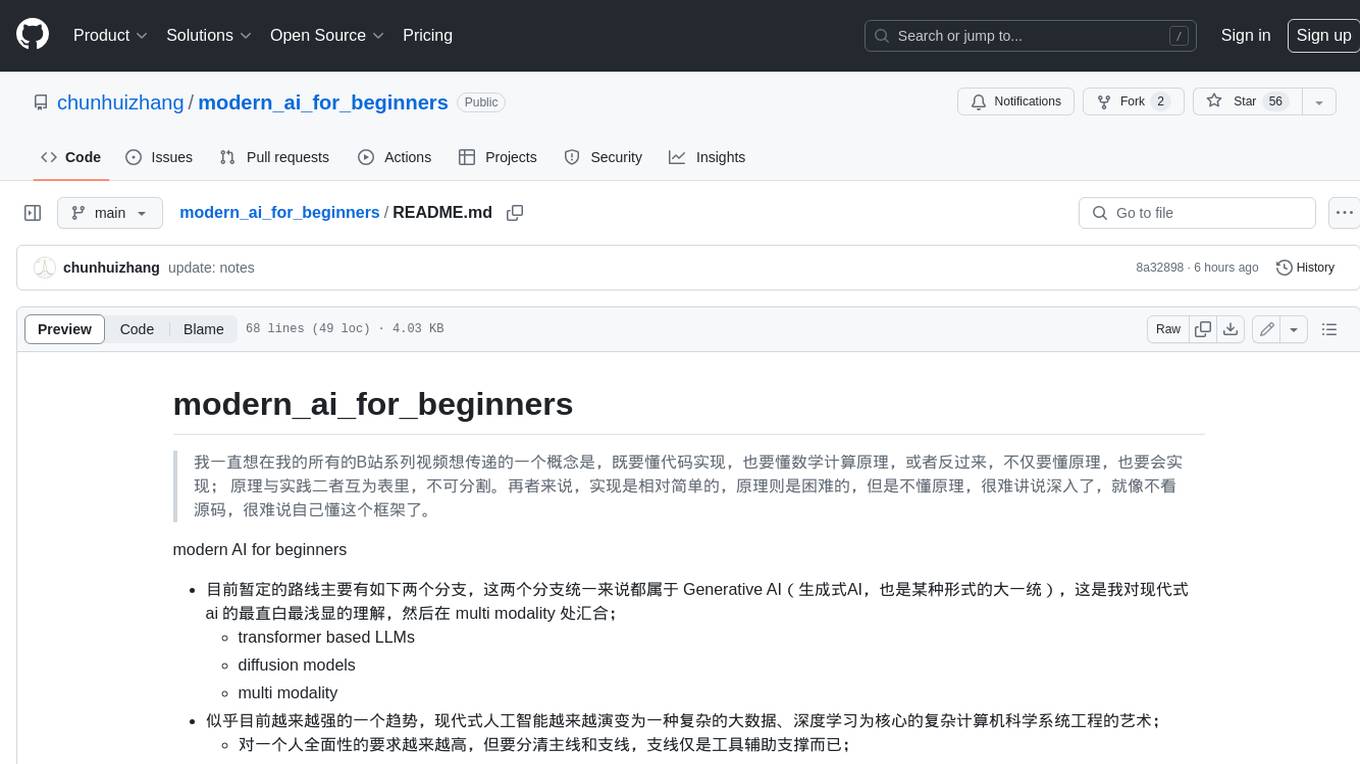
modern_ai_for_beginners
This repository provides a comprehensive guide to modern AI for beginners, covering both theoretical foundations and practical implementation. It emphasizes the importance of understanding both the mathematical principles and the code implementation of AI models. The repository includes resources on PyTorch, deep learning fundamentals, mathematical foundations, transformer-based LLMs, diffusion models, software engineering, and full-stack development. It also features tutorials on natural language processing with transformers, reinforcement learning, and practical deep learning for coders.
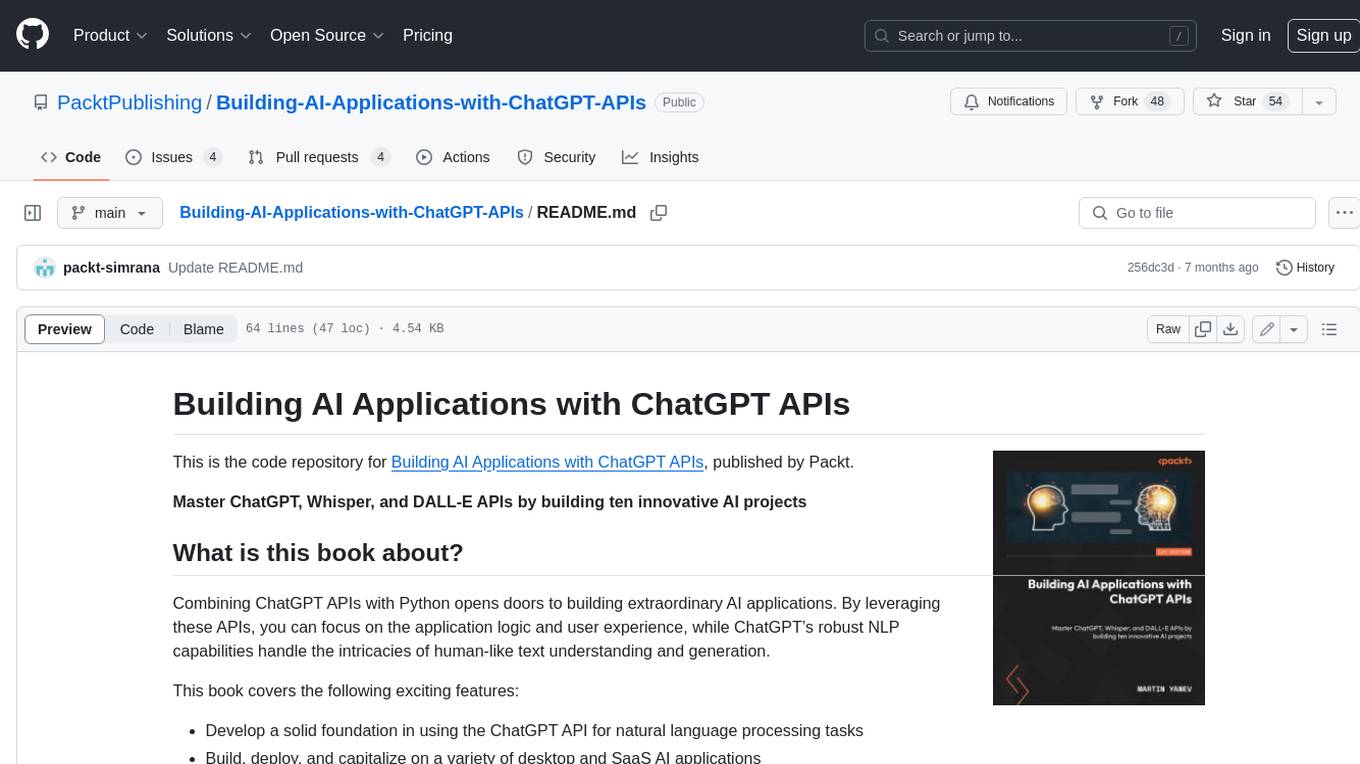
Building-AI-Applications-with-ChatGPT-APIs
This repository is for the book 'Building AI Applications with ChatGPT APIs' published by Packt. It provides code examples and instructions for mastering ChatGPT, Whisper, and DALL-E APIs through building innovative AI projects. Readers will learn to develop AI applications using ChatGPT APIs, integrate them with frameworks like Flask and Django, create AI-generated art with DALL-E APIs, and optimize ChatGPT models through fine-tuning.
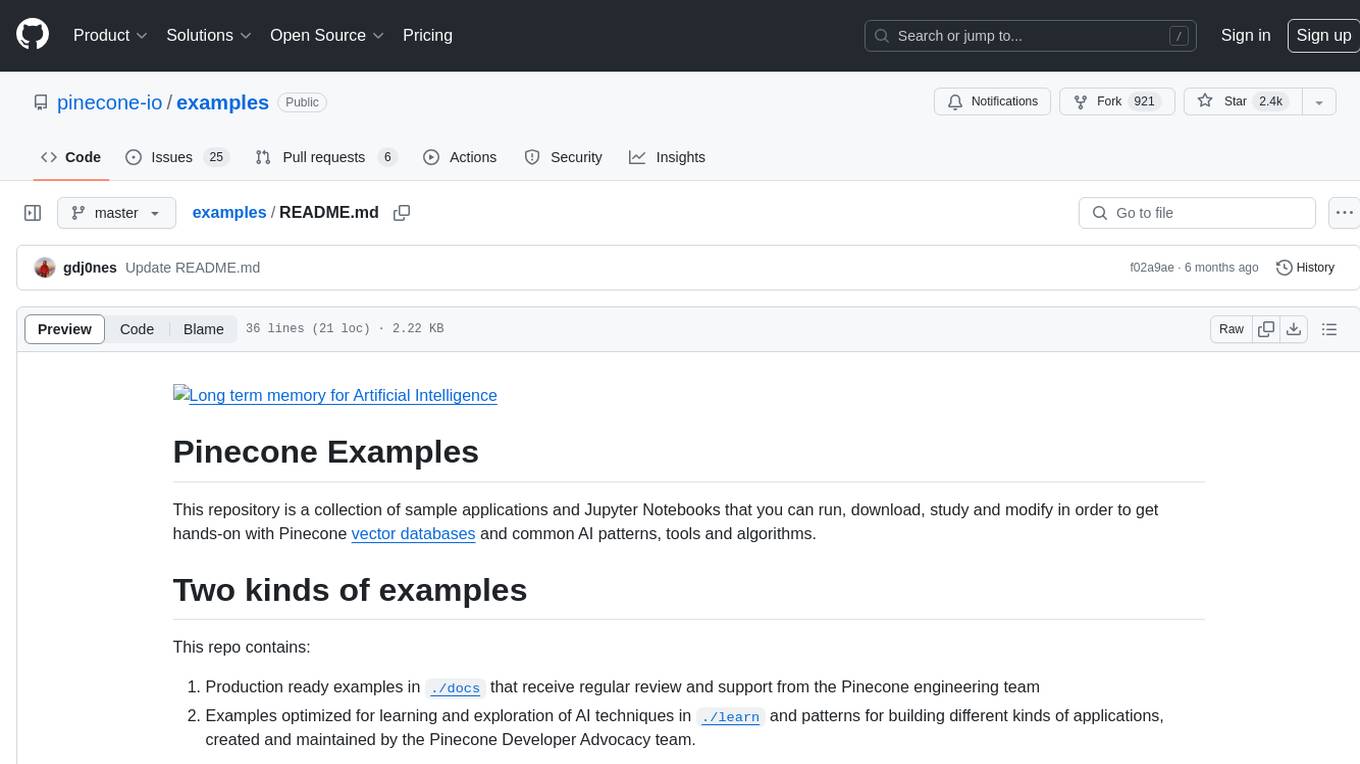
examples
This repository contains a collection of sample applications and Jupyter Notebooks for hands-on experience with Pinecone vector databases and common AI patterns, tools, and algorithms. It includes production-ready examples for review and support, as well as learning-optimized examples for exploring AI techniques and building applications. Users can contribute, provide feedback, and collaborate to improve the resource.
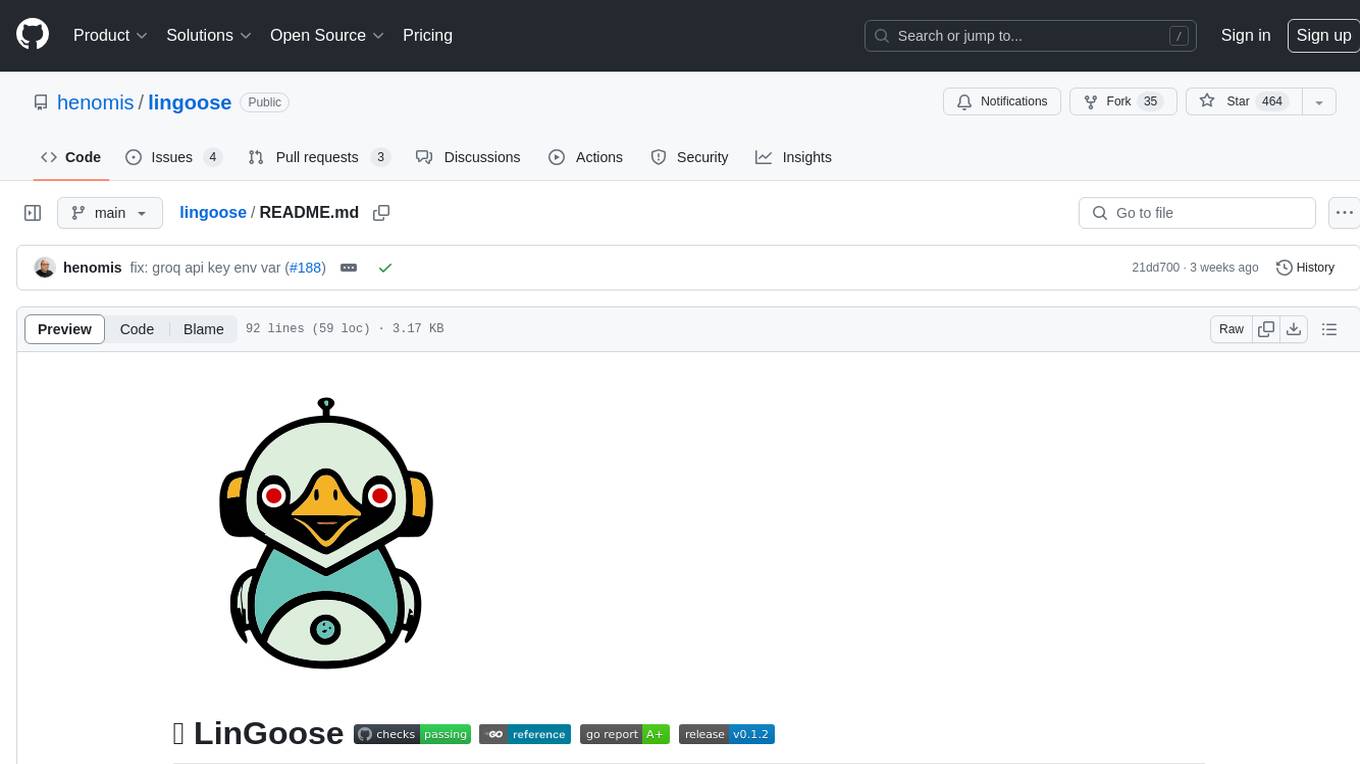
lingoose
LinGoose is a modular Go framework designed for building AI/LLM applications. It offers the flexibility to import only the necessary modules, abstracts features for customization, and provides a comprehensive solution for developing AI/LLM applications from scratch. The framework simplifies the process of creating intelligent applications by allowing users to choose preferred implementations or create their own. LinGoose empowers developers to leverage its capabilities to streamline the development of cutting-edge AI and LLM projects.
For similar jobs

promptflow
**Prompt flow** is a suite of development tools designed to streamline the end-to-end development cycle of LLM-based AI applications, from ideation, prototyping, testing, evaluation to production deployment and monitoring. It makes prompt engineering much easier and enables you to build LLM apps with production quality.

deepeval
DeepEval is a simple-to-use, open-source LLM evaluation framework specialized for unit testing LLM outputs. It incorporates various metrics such as G-Eval, hallucination, answer relevancy, RAGAS, etc., and runs locally on your machine for evaluation. It provides a wide range of ready-to-use evaluation metrics, allows for creating custom metrics, integrates with any CI/CD environment, and enables benchmarking LLMs on popular benchmarks. DeepEval is designed for evaluating RAG and fine-tuning applications, helping users optimize hyperparameters, prevent prompt drifting, and transition from OpenAI to hosting their own Llama2 with confidence.

MegaDetector
MegaDetector is an AI model that identifies animals, people, and vehicles in camera trap images (which also makes it useful for eliminating blank images). This model is trained on several million images from a variety of ecosystems. MegaDetector is just one of many tools that aims to make conservation biologists more efficient with AI. If you want to learn about other ways to use AI to accelerate camera trap workflows, check out our of the field, affectionately titled "Everything I know about machine learning and camera traps".

leapfrogai
LeapfrogAI is a self-hosted AI platform designed to be deployed in air-gapped resource-constrained environments. It brings sophisticated AI solutions to these environments by hosting all the necessary components of an AI stack, including vector databases, model backends, API, and UI. LeapfrogAI's API closely matches that of OpenAI, allowing tools built for OpenAI/ChatGPT to function seamlessly with a LeapfrogAI backend. It provides several backends for various use cases, including llama-cpp-python, whisper, text-embeddings, and vllm. LeapfrogAI leverages Chainguard's apko to harden base python images, ensuring the latest supported Python versions are used by the other components of the stack. The LeapfrogAI SDK provides a standard set of protobuffs and python utilities for implementing backends and gRPC. LeapfrogAI offers UI options for common use-cases like chat, summarization, and transcription. It can be deployed and run locally via UDS and Kubernetes, built out using Zarf packages. LeapfrogAI is supported by a community of users and contributors, including Defense Unicorns, Beast Code, Chainguard, Exovera, Hypergiant, Pulze, SOSi, United States Navy, United States Air Force, and United States Space Force.

llava-docker
This Docker image for LLaVA (Large Language and Vision Assistant) provides a convenient way to run LLaVA locally or on RunPod. LLaVA is a powerful AI tool that combines natural language processing and computer vision capabilities. With this Docker image, you can easily access LLaVA's functionalities for various tasks, including image captioning, visual question answering, text summarization, and more. The image comes pre-installed with LLaVA v1.2.0, Torch 2.1.2, xformers 0.0.23.post1, and other necessary dependencies. You can customize the model used by setting the MODEL environment variable. The image also includes a Jupyter Lab environment for interactive development and exploration. Overall, this Docker image offers a comprehensive and user-friendly platform for leveraging LLaVA's capabilities.

carrot
The 'carrot' repository on GitHub provides a list of free and user-friendly ChatGPT mirror sites for easy access. The repository includes sponsored sites offering various GPT models and services. Users can find and share sites, report errors, and access stable and recommended sites for ChatGPT usage. The repository also includes a detailed list of ChatGPT sites, their features, and accessibility options, making it a valuable resource for ChatGPT users seeking free and unlimited GPT services.

TrustLLM
TrustLLM is a comprehensive study of trustworthiness in LLMs, including principles for different dimensions of trustworthiness, established benchmark, evaluation, and analysis of trustworthiness for mainstream LLMs, and discussion of open challenges and future directions. Specifically, we first propose a set of principles for trustworthy LLMs that span eight different dimensions. Based on these principles, we further establish a benchmark across six dimensions including truthfulness, safety, fairness, robustness, privacy, and machine ethics. We then present a study evaluating 16 mainstream LLMs in TrustLLM, consisting of over 30 datasets. The document explains how to use the trustllm python package to help you assess the performance of your LLM in trustworthiness more quickly. For more details about TrustLLM, please refer to project website.

AI-YinMei
AI-YinMei is an AI virtual anchor Vtuber development tool (N card version). It supports fastgpt knowledge base chat dialogue, a complete set of solutions for LLM large language models: [fastgpt] + [one-api] + [Xinference], supports docking bilibili live broadcast barrage reply and entering live broadcast welcome speech, supports Microsoft edge-tts speech synthesis, supports Bert-VITS2 speech synthesis, supports GPT-SoVITS speech synthesis, supports expression control Vtuber Studio, supports painting stable-diffusion-webui output OBS live broadcast room, supports painting picture pornography public-NSFW-y-distinguish, supports search and image search service duckduckgo (requires magic Internet access), supports image search service Baidu image search (no magic Internet access), supports AI reply chat box [html plug-in], supports AI singing Auto-Convert-Music, supports playlist [html plug-in], supports dancing function, supports expression video playback, supports head touching action, supports gift smashing action, supports singing automatic start dancing function, chat and singing automatic cycle swing action, supports multi scene switching, background music switching, day and night automatic switching scene, supports open singing and painting, let AI automatically judge the content.